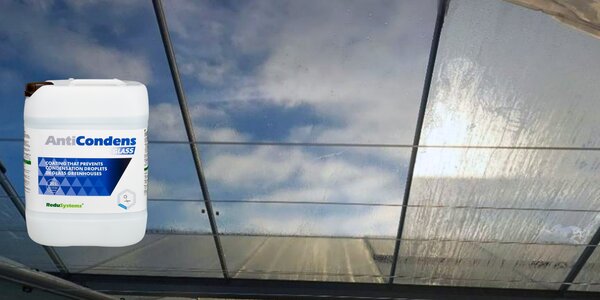AntiCondens from ReduSystems scores high in research and practice
During the winter months, the inside of the greenhouse roof is often wet due to condensation from evaporation. This frequently leads to a loss of growth light, which is already a limiting growth factor in this period. A possible solution is the use of coatings with super-hydrophilic and self-cleaning properties, such as AntiCondens from Lumiforte’s ReduSystems product line. In comparative research by Wageningen University & Research, this coating emerged as the best performer.
Researcher Vida Mohammadkhani from Wageningen evaluated three hydrophilic coatings and materials for their properties and potential added value for greenhouse horticulture. The materials tested included AntiCondens for glass (a version for film greenhouses is also available) from ReduSystems, a self-adhesive hydrophilic film of Japanese origin, and a titanium dioxide (TiO₂)-based coating. These materials were applied to clear glass and tested for their hemispherical light transmission under both dry and wet conditions. Measurements were carried out in the laboratory and over the course of a year in a commercial greenhouse, where natural inorganic and organic contamination could also influence the results.

Paul van Gils, Consultant at Lumiforte
More light under wet conditions
Laboratory measurements showed that hydrophilic coatings improve the light transmission of glass under wet conditions (condensation) compared to standard glass, which under such conditions transmits 3.2% less light than when dry (reference). Glass with the hydrophilic film transmitted 2.8% more growth light in wet conditions, glass with the ReduSystems AntiCondens coating +1.4%, and with the TiO₂ coating +0.9% compared to the dry reference glass. Compared to wet reference glass, the gain in light transmission was respectively 6%, 4.6%, and 4.1%.
Also more light without condensation
Under comparable conditions with clean glass in both dry and wet states, the measurement results in the greenhouse and in the laboratory corresponded well. The ReduSystems AntiCondens coating was the only one that also showed a modest increase in light transmission under dry conditions. Even after a year, this coating continued to perform well in both dry and wet conditions. The self-adhesive film offered no advantage under dry conditions, while the (diffusive) hydrophilic TiO₂ coating transmitted less growth light than untreated reference glass when dry.
Little contamination build-up
During the trial, little dirt or algae accumulated on the glass treated with ReduSystems AntiCondens and the TiO₂ coating. This “self-cleaning” property may have a positive long-term effect on light transmission, although this aspect was not studied in depth. The poorer performance of the self-adhesive film regarding dirt build-up may be related to the (non-professional) way it was applied. The researcher therefore refrains from drawing conclusions on that point.
Research conclusions
Based on the results across different conditions, Mohammadkhani concludes that ReduSystems AntiCondens not only has excellent hydrophilic properties but also provides a slight light gain even under dry conditions. “Apparently, it also has anti-reflective properties, which adds value throughout the year,” she explains. “Its self-cleaning ability is another advantage, as the glass appears to stay cleaner than untreated glass. Over time, this can result in additional light gain compared to untreated surfaces.”
Effective dehumidification
Technical specialist Paul van Gils from Lumiforte highlights the specific condensation properties of ReduSystems AntiCondens and points to additional benefits. “A treatment with AntiCondens ensures that moisture condenses into an even film, where fine droplets quickly drain toward the condensate gutters. Large droplets that reflect light, remain on the glass for a long time, or drip onto the crop do not form. Such ‘condensation rain’ can promote disease and trap moisture inside the greenhouse, exactly what growers want to avoid. Our coating not only increases light transmission in both wet and dry conditions, it also promotes effective dehumidification of the greenhouse air and efficient drainage of condensate through the gutters. That water can easily be reused as irrigation water.”
Formulations for glass and film
In short, ReduSystems AntiCondens offers growers a great deal of value and, according to Van Gils, deserves much wider application. “I’m thinking in particular of cultivation areas that must deal with frequent condensation of humid greenhouse air in autumn and winter. And let’s not forget that there’s also a similar product available for film-covered greenhouses. It has a slightly different formulation but the same properties. It’s easy to apply and remains effective for at least a year, so make the most of it.”